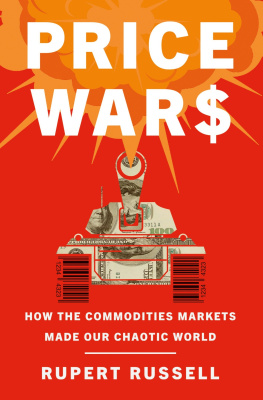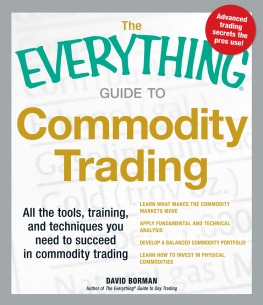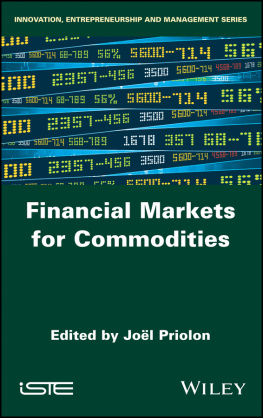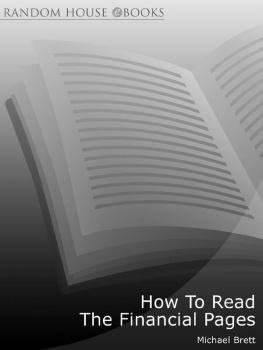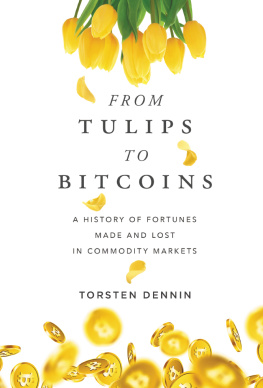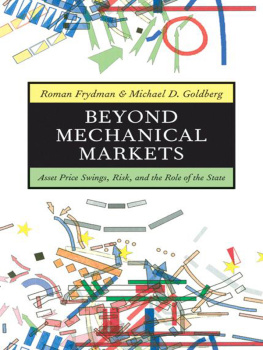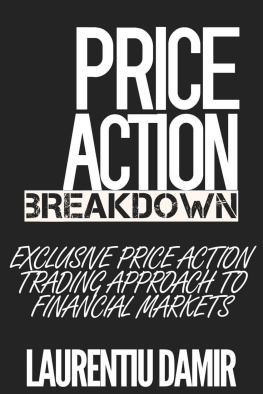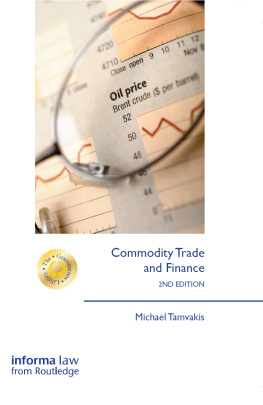Rupert Russell - Price Wars: How the Commodities Markets Made Our Chaotic World
Here you can read online Rupert Russell - Price Wars: How the Commodities Markets Made Our Chaotic World full text of the book (entire story) in english for free. Download pdf and epub, get meaning, cover and reviews about this ebook. year: 2022, genre: History. Description of the work, (preface) as well as reviews are available. Best literature library LitArk.com created for fans of good reading and offers a wide selection of genres:
Romance novel
Science fiction
Adventure
Detective
Science
History
Home and family
Prose
Art
Politics
Computer
Non-fiction
Religion
Business
Children
Humor
Choose a favorite category and find really read worthwhile books. Enjoy immersion in the world of imagination, feel the emotions of the characters or learn something new for yourself, make an fascinating discovery.
- Book:Price Wars: How the Commodities Markets Made Our Chaotic World
- Author:
- Genre:
- Year:2022
- Rating:5 / 5
- Favourites:Add to favourites
- Your mark:
- 100
- 1
- 2
- 3
- 4
- 5
Price Wars: How the Commodities Markets Made Our Chaotic World: summary, description and annotation
We offer to read an annotation, description, summary or preface (depends on what the author of the book "Price Wars: How the Commodities Markets Made Our Chaotic World" wrote himself). If you haven't found the necessary information about the book — write in the comments, we will try to find it.
Rupert Russell: author's other books
Who wrote Price Wars: How the Commodities Markets Made Our Chaotic World? Find out the surname, the name of the author of the book and a list of all author's works by series.
Price Wars: How the Commodities Markets Made Our Chaotic World — read online for free the complete book (whole text) full work
Below is the text of the book, divided by pages. System saving the place of the last page read, allows you to conveniently read the book "Price Wars: How the Commodities Markets Made Our Chaotic World" online for free, without having to search again every time where you left off. Put a bookmark, and you can go to the page where you finished reading at any time.
Font size:
Interval:
Bookmark:
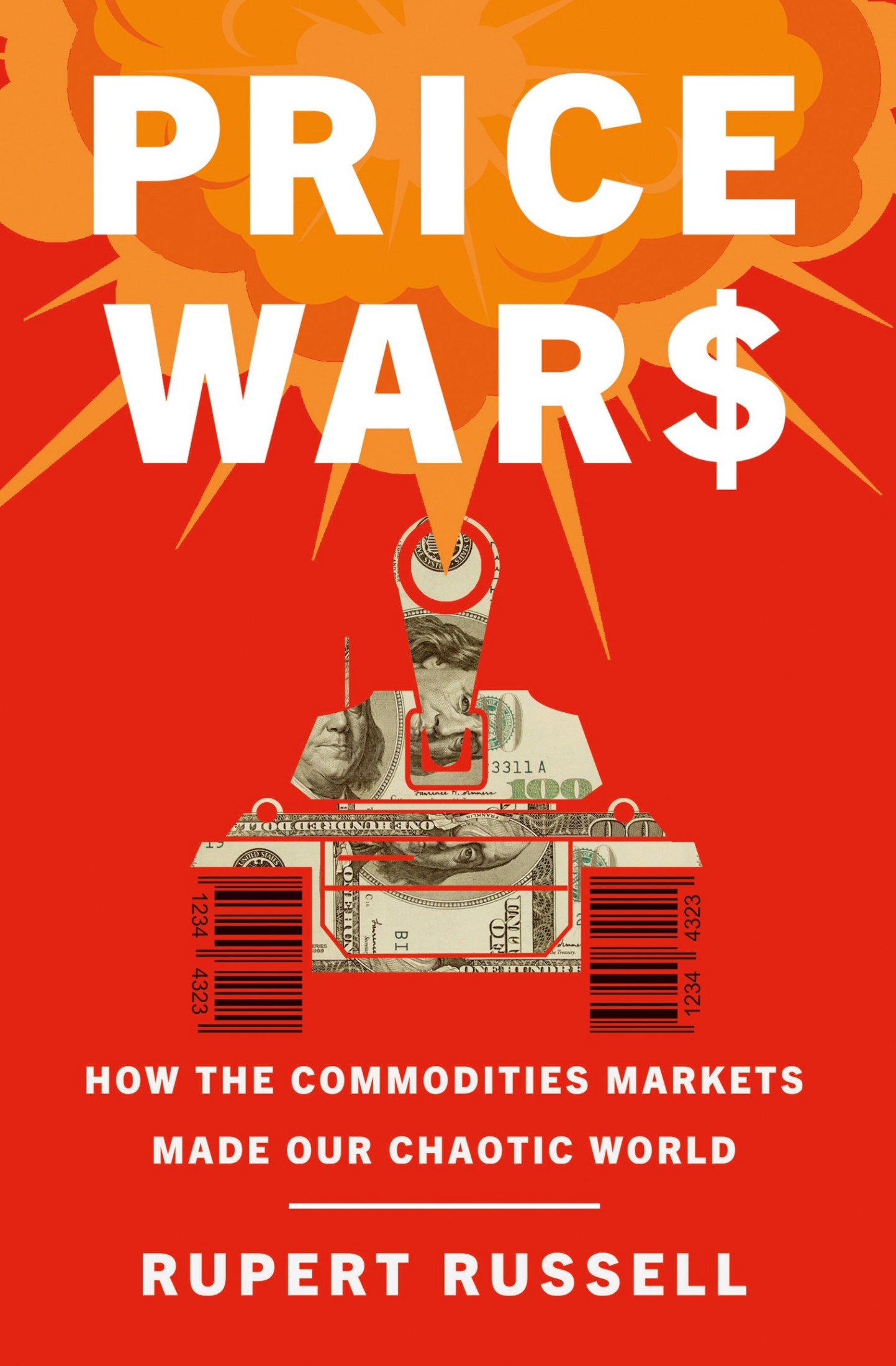
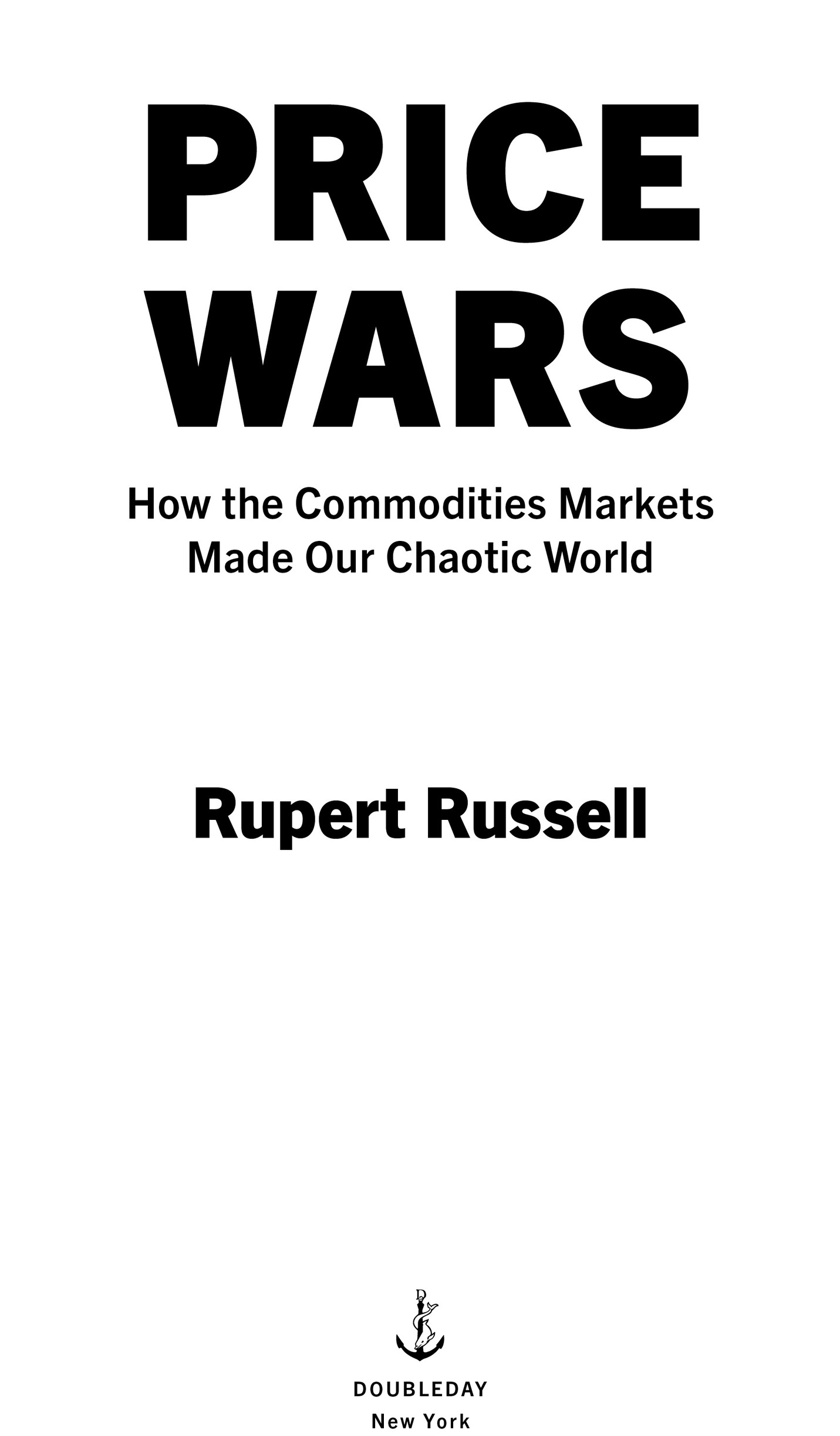
Copyright 2022 by Rupert Russell
All rights reserved. Published in the United States by Doubleday, a division of Penguin Random House LLC, New York, and distributed in Canada by Penguin Random House Canada Limited, Toronto. Originally published in hardcover in Great Britain by Weidenfeld & Nicolson, an imprint of The Orion Publishing Group, a Hachette UK Company, London.
www.doubleday.com
doubleday and the portrayal of an anchor with a dolphin are registered trademarks of Penguin Random House LLC.
Cover images: tank jiris/Shutterstock; bills Medioimages/Photodisc/Getty; explosion Acrylik Vectors/Shutterstock
Cover design by Michael J. Windsor
Library of Congress Cataloging-in-Publication Data
Names: Russell, Rupert, author.
Title: Price wars : how the commodities markets made our chaotic world / Rupert Russell.
Description: New York : Doubleday, [2022] | Includes index.
Identifiers: LCCN 2021031111 (print) | LCCN 2021031112 (ebook) | ISBN 9780385545853 (hardcover) | ISBN 9780385545860 (ebook)
Subjects: LCSH: Commodity exchanges. | International finance. | Pricing.
Classification: LCC HG6046 .R94 2022 (print) | LCC HG6046 (ebook) | DDC 332.64/4dc23
LC record available at https://lccn.loc.gov/2021031111
LC ebook record available at https://lccn.loc.gov/2021031112
Ebook ISBN9780385545860
ep_prh_6.0_139146248_c0_r0
To Mum
I crawl into a tent. Arabic chatter bounces between a dozen teenage boys as they pass around a bottle of wine. Some are sitting in a circle, others are lying on stretcher-like beds against canvas walls. A few speak English. One tells me theyre from Iraq. He tells me how he travelled with his girlfriend through Turkey to the shores of the Mediterranean. I was standing on the beach, he says, gesturing eastwards towards the Turkish coast seven miles away. I was just wearing my shorts. No wallet, nothing. I walked into the water. Then
He is gay! someone shouts behind me. I flinch. Is he talking about me? I am gay.
I turn around. One of the teenagers has stood up. Hes holding the bottle of wine and pointing at someone lying on a bed. The drunkard is short, skinny and youngmaybe sixteen years old.
He catches my eye. He is gay! He pauses to wait for my response.
My awkwardness peaks. I freeze. Maybe if I dont move, Ill become invisible somehow.
He persists. He is gay!
I change tactics and ignore him. What happened next? I shout to the swimmer.
I started to swi he begins.
Where are you from? the drunkard asks me.
I surrender. Im from Britain.
Brittany! Brittany! he chants.
I turn back to the swimmer. What did you do? I say louder still.
I got into the water, he shouts back, started to swim.
Brittany! Brittany!
I was in the water for two hours and the
He is gay!
and then the helicopter saw me. A boat came.
He is gay! he says as he jumps into the middle of the circle and pulls his trousers down. He stands for a moment expecting a reaction. Silence. Heads down, we all pretend not to notice. He twists, trips and collapses into a disorderly heap.
Strangely, this is what Ive come looking for: chaos.
Its the summer of 2018 and Im sitting in the Moria refugee camp. Tucked into a mountainside on Lesvos, the Greek island closest to Turkey, its the gateway from East to West and the epicentre of the global refugee crisis. Wars, famines, recessions, persecutions thousands of miles from each other converge here through the one thing they all create: people searching for safety. From these few acres an invisible web of connections radiates out across the Mediterranean, the Sahara, the Euphrates and the Caucasus, linking disparate episodes of chaos large and small. Moria is the node.
Ive come here in the hope of unscrambling my brain. It hasnt been at ease since 24 June 2016. It was the day after the British public voted to leave the European Union (EU) and I had just returned to the UK after a decade living in America. When my plane landed, I fired up my phone to discover that Prime Minister David Cameron had resigned. No one seemed to have any idea what was going on, least of all me, who had missed the whole thing. I was confused. I grew up with Princess Diana and the Spice Girls and movies where Hugh Grant struggles to find love. I didnt recognise this hermit kingdom. I was now a stranger in a strange land.
It was a topsy-turvy time, but at least, I reassured myself, parochial. Like our culinary delights toad in the hole and bubble and squeak, foreigners saw our political tastes as similarly eccentric and not for them. But before long, there was a movement to import this British delicacy. At the ballot box on November 8th we are going to do something so special, presidential candidate Donald J. Trump told a crowd of supporters in Raleigh, North Carolina. It will be an amazing day, it will be called Brexit plus plus plus.
The weirdness was just beginning. Brexit plus Brexit plus plus plus were soon subsumed by an avalanche of horrors. The relentless Feed of tweets and posts and headlines and memes and viral videos plunged me into a digital vertigo, a kaleidoscope of tear gas, beheadings, black flags, floating bodies, burning rainforests, caged children and a new breed of monsters at the centre of it all. Nigel Farage, Donald Trump, Viktor Orbn, Matteo Salvini, Jair Bolsonaro, Rodrigo Duterte, Nicols Maduro, Narendra Modi, Vladimir Putin, Xi Jinping, Kim Jong-un, Boko Haram and ISIS towered over everything, Godzilla-like. Everywhere they went destruction followed. Each calamity fed The Feed, a real-time conveyer belt of anxiety and outrage delivered directly into my brain. Equal parts Hollywood disaster movie and reality TV show, the spectacle was horrifying and captivatinga global-scale car crash I struggled to look away from.
I felt ill equipped to deal with this monstrous world. Born in 1985, I had grown up in London during the peaceful and prosperous 1990s. History was supposed to be over. It wasnt until I was sixteen that I saw my first real monsters when planes flew into the Pentagon and the World Trade Center on live TV. These monsters were, reassuringly, outsiders. They came from distant caves in faraway lands. Now, the monsters came from inside the bubble I called home. The familiar turned alien. My brain scrambled.
I had to know: where had the monsters come from?
To map their origins, Id have to make sense of the chaos they had created. Id somehow have to bring order to sprawling histories, endless variables and ever-growing datasets. Fortunately, mathematicians in the 1970s developed the tools for just such a task. These legendary chaos theorists discovered that what looks like irreducible randomness can, in fact, have a logic. And this logic need not be complicated. It can be devilishly simple.
Imagine mapping the extinction of the dinosaurs. You could describe in detail every single micro event, every tsunami, hurricane and alteration to the ecosystem that, over thousands of years, led to their demise. Or you could point to one macro moment: when an asteroid struck the earth. It was this moment that triggered a cascade: a chain reaction that grew and grew and grew. Chaos theory teaches us that such moments need not be big. Triggering events can be very small, as small as the flap of a butterflys wings. Perhaps my cartography of chaos just needed to discover one thing. I just needed to spot the butterfly.
Font size:
Interval:
Bookmark:
Similar books «Price Wars: How the Commodities Markets Made Our Chaotic World»
Look at similar books to Price Wars: How the Commodities Markets Made Our Chaotic World. We have selected literature similar in name and meaning in the hope of providing readers with more options to find new, interesting, not yet read works.
Discussion, reviews of the book Price Wars: How the Commodities Markets Made Our Chaotic World and just readers' own opinions. Leave your comments, write what you think about the work, its meaning or the main characters. Specify what exactly you liked and what you didn't like, and why you think so.

